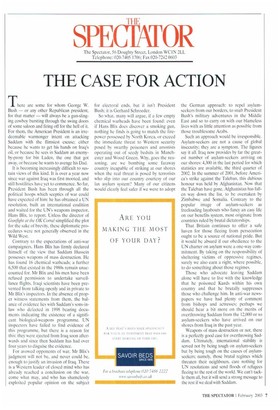SPECt' TOR
The Spectator, 56 Doughty Street, London WC1N 2LL Telephone: 020-7405 1706; Fax 020-7242 0603
THE CASE FOR ACTION
There are some for whom George W. Bush — or any other Republican president, for that matter — will always be a gun-slinging cowboy bursting through the swing doors of some saloon and firing off for the hell of it. For them, the American President is an irredeemable warmonger intent on attacking Saddam with the flimsiest excuse; either because he wants to get his hands on Iraq's oil, or because he sees in Saddam an enemyby-proxy for bin Laden, the one that got away, or because he wants to avenge his Dad.
It is becoming increasingly difficult to sustain views of this kind. It is over a year now since war against Iraq was first mooted, and still hostilities have yet to commence. So far, President Bush has been through all the political hoops which sceptics of war could have expected of him: he has obtained a UN resolution, built an international coalition and waited for the UN's weapons inspector, Hans Blix, to report. Unless the director of Gunfight at the OK Corral simplified the plot for the sake of brevity, these diplomatic procedures were not generally observed in the Wild West.
Contrary to the expectations of anti-war campaigners, Hans Blix has firmly declared himself of the view that Saddam Hussein possesses weapons of mass destruction. He has found 16 chemical warheads: a further 6,500 that existed in the 1980s remain unaccounted for. Mr Blix and his men have been refused permission to undertake surveillance flights. Iraqi scientists have been prevented from talking openly and in private to Mr Blix's inspectors. In the absence of proper witness statements from them, the balance of evidence lies with Saddam's sons-inlaw who defected in 1998 bearing documents indicating the existence of a significant biological-weapons programme. UN inspectors have failed to find evidence of this programme, but there is a reason for this: they were ejected from Iraq soon afterwards and since then Saddam has had over four years to disguise the evidence.
For avowed opponents of war, Mr Blix's judgment will not be, and never could be, enough to justify an invasion of Iraq. There is a Western leader of closed mind who has already reached a conclusion on the war, come what may, and who has shamelessly exploited popular opinion on the subject for electoral ends, but it isn't President Bush; it is Gerhard Schroeder.
So what, many will argue, if a few empty chemical warheads have been found: even if Hans Blix does discover a smoking gun, nothing he finds is going to match the firepower possessed by North Korea, or exceed the immediate threat to Western security posed by swarthy poisoners and arsonists operating out of seedy bedsits in Manchester and Wood Green. Why, goes the reasoning, are we bombing some faraway country incapable of striking at our shores when the real threat is posed by terrorists who slip into our country courtesy of our lax asylum system? Many of our citizens would clearly feel safer if we were to adopt the German approach: to repel asylumseekers from our borders, to snub President Bush's military adventures in the Middle East and so to carry on with our blameless lives with as little attention as possible from those troublesome Arabs.
Such an approach would be irresponsible. Asylum-seekers are not a cause of global insecurity; they are a symptom. The figures say it all. Iraq now provides by far the greatest number of asylum-seekers arriving on our shores: 4,300 in the last period for which statistics are available, the third quarter of 2002. In the summer of 2001, before America's strike against the Taleban, this dubious honour was held by Afghanistan. Now that the Taleban have gone. Afghanistan has fallen way down the list, to be overtaken by Zimbabwe and Somalia. Contrary to the popular image of asylum-seekers as freeloading layabouts who fancy an easy life on our benefits system, most originate from countries ruled by brutal dictatorships.
That Britain continues to offer a safe haven for those fleeing from persecution ought to be a source of national pride. But it would be absurd if our obedience to the UN charter on asylum were a one-way commitment. By taking on the responsibility of sheltering victims of oppressive regimes, surely we also earn a right, where possible, to do something about those regimes.
Those who advocate leaving Saddam alone will have to live with the knowledge that he poisoned Kurds within his own country and that he brutally suppresses those who challenge him. In anti-war newspapers we have had plenty of comment from bishops and actresses; perhaps we should hear a bit more on the merits of overthrowing Saddam from the 12,000 or so asylum-seekers who have arrived on our shores from Iraq in the past year.
Weapons of mass destruction or not, there is a perfectly good case for overthrowing Saddam. Ultimately, international stability is served not by being tough on asylum-seekers but by being tough on the causes of asylumseekers; namely, those brutal regimes which threaten their neighbours, care nothing for UN resolutions and send floods of refugees fleeing to the rest of the world. We can't tackle them all, but it will send a strong message to the rest if we deal with Saddam.


























































 Previous page
Previous page